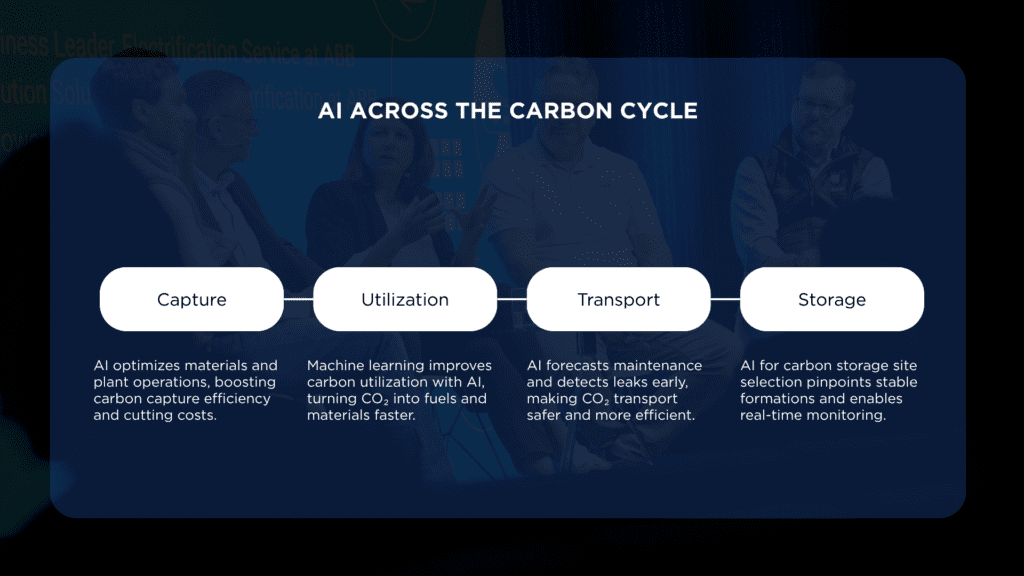As the race to net-zero intensifies, the energy sector is looking beyond pilots and prototypes to solutions that can scale fast. One of the most powerful tools enabling this shift is artificial intelligence (AI) – already accelerating the transition from experimental carbon-capture projects to commercially viable systems.
According to the IEA Greenhouse Gas Programme, AI now supports every stage of the carbon-capture, utilization, and storage (CCUS) value chain – from modeling and process control to monitoring and verification. The question is no longer if AI can help, but how quickly it can make carbon capture scalable, affordable, and verifiable.
Smarter Capture: AI and Carbon Capture Efficiency
Capturing CO₂ remains the costliest and most energy-intensive part of CCUS. AI is changing that by enhancing carbon capture efficiency through dynamic process optimization and data-driven materials research.
AI-powered models now predict how sorbents behave under different temperatures and pressures, helping engineers fine-tune systems in real time. Insights from recent McKinsey Carbon Management reports suggest process-optimization algorithms can reduce capture costs by 15–25%.
From Carbon to Value: Utilization and Conversion
Turning captured CO₂ into new products – fuels, building materials, or industrial feedstocks has become a frequent practise. The growing field of carbon utilization with AI applies machine learning to control chemical reactions, improve catalyst performance, and cut energy input in conversion systems.
Projects highlighted at Energy Tech Summit have demonstrated how AI helps balance reaction conditions in real time, significantly improving efficiency and reducing waste. This shift transforms carbon from a liability into an asset – a cornerstone of the emerging circular-carbon economy.
Transporting CO₂: Efficiency and Safety
Building a reliable CO₂ transport network is essential to scaling CCUS. Pipelines, hubs, and terminals demand 24/7 safety oversight – and that’s where AI excels.
AI-driven analytics can predict faults before they occur, optimize routing, and improve energy use across the network. Operators now combine sensor data with predictive algorithms to detect anomalies instantly, enhancing both safety and cost control. As regional carbon-transport corridors expand across Europe and Asia, these tools will be key to secure and efficient carbon flows.
Storage Safety: AI for Carbon Storage Site Selection
Selecting and maintaining storage sites is one of CCUS’s biggest technical challenges – and one where AI for carbon storage site selection is proving invaluable.
Predictive models integrate geological, seismic, and geomechanical data to identify stable formations with minimal leakage risk. The Global CCS Institute reports that AI-enhanced analysis can reduce site-screening time by up to 50%.
In large-scale demonstration zones, AI systems monitor pressure, temperature, and microseismic activity to ensure long-term stability – helping build confidence among regulators and investors.

How AI strengthens each stage of the carbon cycle – from smarter capture systems to secure long-term storage.
Scaling Challenges: What’s Next for AI in Carbon Storage
Despite accelerating progress, several barriers remain: fragmented datasets, inconsistent reporting frameworks, and limited interoperability between monitoring systems.
That’s why innovators featured at Compute Challengers and Energy Tech Challengers are developing open-data and explainable-AI models to create a trusted digital backbone for CCUS. Their solutions focus on measurement, reporting, and verification (MRV) – essential steps for scaling investment and policy adoption.
The future of AI in carbon storage will depend on these transparent, connected systems that allow stakeholders to monitor captured CO₂ in real time and prove storage permanence.
The Road Ahead
Even with major technical progress, AI-driven CCUS still faces practical challenges: fragmented datasets, inconsistent monitoring standards, and high deployment costs. These gaps limit interoperability and make it harder to verify carbon storage performance at scale.
To address this, innovators showcased at Compute Summit – and its startup competition Compute Challengers– are developing next-generation computational frameworks that make large-scale modeling and real-time analytics more accessible to carbon management projects. Meanwhile, Energy Tech Challengers finalists are building open-data and explainable-AI tools to strengthen monitoring, reporting, and verification (MRV) for CCUS systems.
These conversations will advance at Energy Tech Summit 2026 (April 15–16, Bilbao), where leaders from Google, Microsoft, Shell, ABB, Iberdrola, and Breakthrough Energy Ventures will join investors such as Generate Capitaland Energy Impact Partners, alongside innovators like Thorizon, Vertoro, and Reverion. Together, they’ll explore how AI, carbon capture, and compute infrastructure are accelerating the path to large-scale decarbonization.
The future of AI in carbon storage will hinge on these cross-sector collaborations – combining computational power, data transparency, and industrial deployment to turn CCUS into a scalable climate solution.
Q&A: Understanding AI’s Role in Carbon Capture and Storage
Q1. How is AI improving carbon capture efficiency?
AI optimizes plant operations and material performance, dynamically adjusting conditions to maximize absorption rates and lower costs. This leads to measurable gains in carbon capture efficiency across both industrial and pilot-scale projects.
Q2. What is carbon utilization with AI?
Carbon utilization with AI refers to using intelligent models to convert CO₂ into fuels, chemicals, and building materials more efficiently – turning emissions into valuable commodities.
Q3. How does AI support carbon storage site selection?
AI for carbon storage site selection integrates vast datasets to identify safe, high-capacity geological formations while predicting long-term stability and potential risks.
Q4. What are the main challenges in scaling AI for CCUS?
Data fragmentation, interoperability, and high upfront costs remain key hurdles. Industry initiatives and forums such as Compute Summit are advancing shared standards to close these gaps.
Q5. What does the future of AI in carbon storage look like?
The future of AI in carbon storage lies in real-time, automated verification and transparent MRV systems – helping financiers and policymakers trust CCUS performance at scale.

